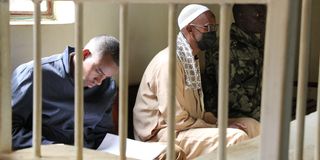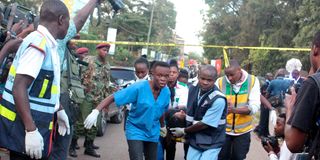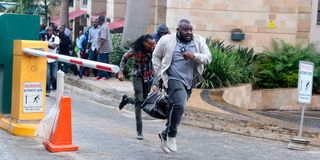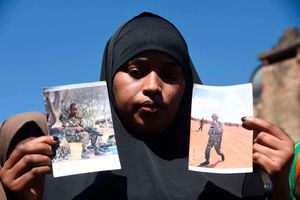
Hussein Mohamed Abdille Ali and Mohamed Abdi Ali have been sentenced to 30 years in jail for facilitating the 2019 Dusit attack, which left 21 people dead.
Two men who aided terrorists in the deadly Dusit D2 hotel attack six years ago have been sentenced to 30 years in prison each.
Hussein Mohamed Abdille Ali and Mohamed Abdi Ali were handed the sentence by High Court Judge Diana Kavedza, who found them guilty of facilitating the 2019 attack, which left 21 people dead.
The court concluded that the duo provided support to the attackers by sending them money and helping them to acquire identification documents. Justice Kavedza ruled that the two conspired with others not before the court, including Adamu Chege and lead attacker Ali Salim Gichunge, alias Farouk, to carry out the assault on the afternoon of January 15, 2019.

Scenes from Dusit hotel that was attacked by terrorists on January 15, 2019.
The attack began when a suicide bomber, later identified as Khalid Mahir Riziki, detonated an explosive vest outside the Secret Garden Restaurant at the 14 Riverside complex. Armed terrorists, led by Gichunge, then opened fire indiscriminately on guests and staff.
The prosecution called 45 witnesses, including a special agent from the US Federal Bureau of Investigation (FBI), who detailed the planning and execution of the coordinated attack. Gichunge and four other terrorists were killed during the operation to neutralise the assailants.
Evidence presented in court showed that the attackers were in constant communication with al-Shabaab operatives in Jilib, Somalia. These operatives used Facebook accounts such as "Elusive Router" and "John Kingston" to send directions to the attackers.
One of the accounts, Elusive Router, was created a day before the attack and was allegedly intended to live-stream the events. Another Facebook account linked to the planning of the attack, registered as "Adamu Chege", was traced back to April 2018.
Analysis revealed that the IP address was connected to Mohamed Yare Abdallah, a known terror suspect involved in a previously foiled attack targeting the Kenyatta International Convention Centre (KICC) and Parliament Buildings.
The court noted that the Dusit D2 attack coincided with the third anniversary of the deadly al-Shabaab raid on a Kenya Defence Forces base in El Adde, Somalia.

Red Cross personnel help those rescued from Dusit hotel attack on January 15, 2019.
Planning for the Dusit attack involved 22 phone calls from a Somali number to Riziki, the suicide bomber, who travelled from Somalia to El Wak, Kenya, on January 11, 2019. CCTV footage showed that the suspect conducted reconnaissance of the complex the day before the attack, entering at around 11.22am and remaining for approximately two hours.
On the day of the attack, a vehicle carrying the assailants was seen entering the complex at 3.19pm. The bomber, dressed in a black suit, was dropped off at the driveway. After pacing and talking on the phone for about five minutes, he detonated the bomb at 3.24pm. Immediately after, four gunmen entered the complex and began shooting randomly.
A total of 183 live rounds and 1,052 spent cartridges were recovered at the scene. The prosecution said that the attackers used coded language, referring to bullets as "seeds", victims as "chickens", and attackers as "kids".
Telecommunications data, financial records, and witness testimonies confirmed that Abdille and Ali were instrumental in facilitating the attack. Internet access, key to communication with foreign operatives and local coordination, was also traced back to the two.
One of the attackers, Siyat Omar Abdi, used fake identification documents arranged by Abdille to leave the Dagahaley refugee camp undetected. He later moved to Muchatha in Kiambu County, where he met Gichunge. The two rented a house and stayed together as they planned the attack.

People run for their lives during the Dusit hotel attack on January 15, 2019.
Though Abdille claimed he was only 15 years old at the time and therefore incapable of aiding the attackers, the court dismissed this defence. Medical experts testified that Abdille was an adult. A doctor from Mbagathi Hospital noted that Abdille’s wisdom teeth had erupted, typically a sign of being over 17 years old. “The mouth can lie, but teeth do not lie,” the doctor stated.
Abdille also denied knowing Adamu Chege, one of the key terror coordinators. However, messages retrieved from his Facebook account contradicted his claim and revealed frequent communication with Chege. Justice Kavedza noted that the conversations "demonstrate a degree of familiarity that could not be attributed to a one-off interaction."
As for Mohamed Abdi Ali, who described himself as a money merchant from Mandera, the court found that he had wired a total of Sh836,900 to Gichunge using several mobile phone numbers, including one registered to his deceased brother. The funds were used to support the logistics and day-to-day needs of the attackers in the months leading to the assault.
The money helped purchase motor vehicle registration number KCN 340E, which the attackers used on the day of the assault. It also covered rent, household items, and food. “In view of the foregoing, I find the second accused, Mohamed Abdi Ali, guilty of the fourteen counts for the offence of facilitation of a terrorist act, contrary to Section 9(A) of the Prevention of Terrorism Act,” said Justice Kavedza in her May 22 judgment.










